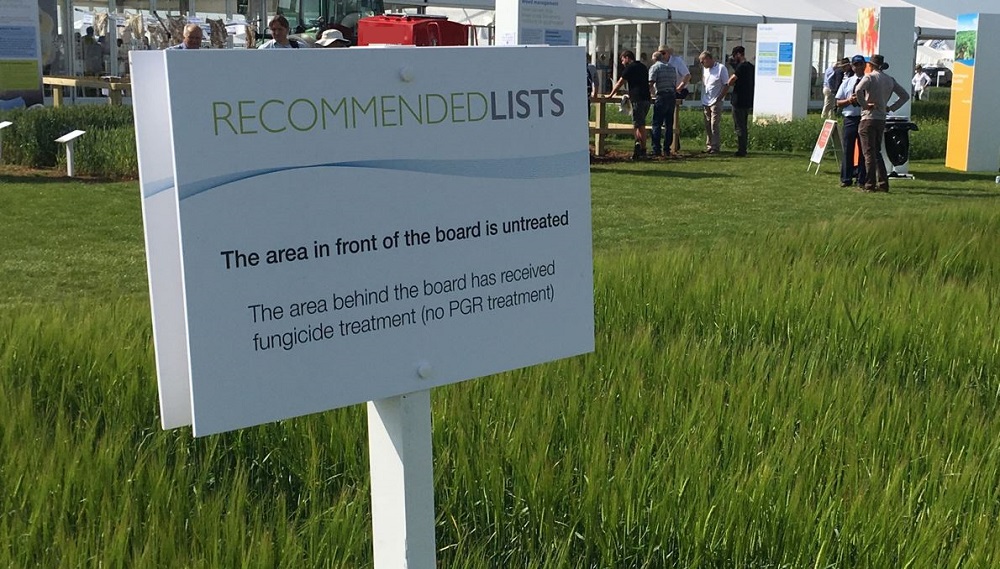- Home
- Knowledge library
- AHDB Recommended Lists for cereals and oilseeds (2021–26)
AHDB Recommended Lists for cereals and oilseeds (2021–26)
Summary
Downloads
Recommended List Crop Committee Handbook 2025 Protocol 001 for cereal varieties in RL trials (2022–26) Protocol 002 for early sown winter wheat varieties in RL trials (2022–26) Protocol 003 for winter oilseed rape varieties in RL trials (2022–26) Jan 2024 Protocol 004 for winter oilseed rape varieties in NL trials (2022–26) Protocol 005 for spring oilseed rape varieties in DL trials (2022–26) Protocol 006 for winter wheat vernalisation assessment plots in RL trials (2022–26) Protocol 007 for assessment of sterility and shedding in winter wheat varieties in RL trials (2022–26) Protocol 008 for wheat milling and baking sample production plots in RL trials (2022–26) Protocol 009 for sprouting assessment wheat plots in RL trials (2022–26) Protocol 010 for inoculated disease plots in RL trials (2022–26) Protocol 101 for grain distilling (high nitrogen) plots in RL trials (2022–26) Protocol 102 - LIN22-26 - AHDB DL spring linseed trial protocol H22-26 (Mar 2025) Protocol 103 for sampling cereal varieties in RL trials (2022–26) Protocol 105 for winter oilseed rape vigour assessments in RL trials (2022–26) Protocol 106 - Verticillium stem stripe of oilseed rape H23 Protocol 201 - Cereal Fungicide Protocol - 2024 GREAT BRITAIN - Final Protocol 202 - RL Cereal PGR Protocol 2024 - Final Protocol 203 - Variety List Cereal PGR Protocol 2024 - Final Protocol 204 - Oilseeds Fungicide Protocol - 2024 - Final Protocol 205 - Non-target disease Protocol 2024- Final Protocol 206 for plant protection products (ag chem) labels (2022–26) Protocol 207 for cabbage stem flea beetle damage assessments in winter oilseed rape varieties in RL trials (2022–26)About this project
The challenge
The arrival of a new variety to the market represents the culmination of years of investment and considerable effort by commercial plant breeding companies.
Over several years, they create thousands of lines, selecting and refining them until they are satisfied that they have a variety that will be competitive.
When such a variety is identified, it undergoes two years of National List testing to see if it is morphologically distinct, genetically uniform and stable (DUS). The National List system is funded by the fees paid by breeders and is managed by APHA.
In the field and lab, the variety is assessed to prove its value for cultivation and use (VCU).
If testing is successful, the variety is added to the National List and the applicant granted Plant Breeders Rights, which means seed can be sold.
The National List contains a large number of varieties and interpretation of the data on variety performance is challenging. Further testing is required to establish whether any new variety on the National List has a sufficient ‘balance of features’ (covering agronomic, quality end-use and yield traits) likely to give an economic benefit to the industry.
The project
This project will undertake trials and tests for the 2021/22 to 2025/26 cropping years and provide independent data, through the production of the AHDB Recommended Lists (RL) for cereal and oilseeds.
Lists will be published each December for the following crops:
- Winter wheat
- Spring wheat
- Winter barley
- Spring barley
- Winter oats
- Spring oats
- Winter oilseed rape
In addition, trials will be undertaken to provide independent data for Descriptive Lists (DLs) for the following crops:
- Spring oilseed rape
- Spring linseed
- Winter rye
- Winter triticale
The results
All results can be accessed via a dedicated web page: ahdb.org.uk/rl
The benefits
The RL provides numerous benefits to multiple stakeholders, including:
- Growers and agronomists – independent information for decisions on variety choice and management, including integrated pest management (IPM)
- Breeders – independent evaluation of varieties and promotion of new varieties with key characteristics that growers value
- MAGB and UKFM – independent evaluation of quality traits of new varieties, ensuring a reliable supply of grain with the right qualities into the supply chain
- Research community – a resource of variety characteristics and performance, leading to the development of new and improved traits and varieties
Note: This project forms part of a long-term investment by AHDB in UK variety trials. Also spanning five years (2016–21), the predecessor to this project (AHDB project 212000110) was completed under an AHDB contract for £7,953,359, with a total project value of £20,263,209.
The protocols
The RL publication is based on the analysis of hundreds of UK trials conducted across several years. The documents on these pages explain how the RL project is managed. They cover information on the trials and the decision-making process, including the reasons for adding and removing varieties from RL.



